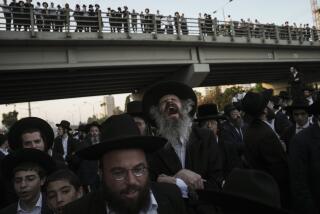Ultra-Orthodox Rabbis Seek to Define Judaism
- Share via
NEW YORK — Ultra-Orthodox rabbis on Monday carried out their vow to declare the country’s two largest Jewish denominations outside of Judaism, and said that Israeli politics as much as religious differences are behind the move that has shaken Jews across the United States.
But even as the Union of Orthodox Rabbis of the U.S. and Canada pronounced that the mainstream Conservative and Reform movements are not Judaism, leaders of the targeted denominations sought to minimize the edict’s importance.
And leaders of two larger and more moderate Orthodox groups--the Rabbinical Council of America and the Union of Orthodox Jewish Congregations of America--distanced themselves from the pronouncement.
That pronouncement declared, “There is only one Judaism: Torah Judaism. The Reform and Conservative are not Judaism at all, but another religion.”
Rabbi David Hollander, a member of the ultra-Orthodox union’s executive board, said the declaration did not attempt to disenfranchise individual Jews.
“A child born to a Jewish mother is a Jew forever no matter how far they stray from Judaism,” he said.
The formal legal finding, known as a halachic ruling, prohibits prayer in a non-Orthodox temple at any time, even on the High Holy Days, and calls on all to pray at home if they can’t walk to an Orthodox synagogue.
The edict--spelled out by rabbis in traditional black hats and beards--also takes the two rival movements to task for condoning interfaith marriages and homosexuality, and asserts that conversions to Judaism within those denominations are null and void.
But non-Orthodox rabbis said most affiliated Jews in the United States--an estimated 90% of whom belong to Conservative or Reform temples--will simply ignore the ruling.
“The people who will abide by that ruling are the people who already act that way,” said Rabbi Joel Rembaum, of Temple Beth Am in Los Angeles, a Conservative synagogue.
The issue is at the heart of a volatile controversy within Judaism over who is a Jew. Others, including the Board of Rabbis of Southern California--which represents all branches of Judaism--worry that the controversy may divide American Jews at a critical time both for Israel and the Middle East peace process. But some said the controversy may serve to bring the community together.
Even moderate Orthodox leaders, while acknowledging religious differences with the non-Orthodox, said unity must be emphasized. Among others taking that tack was the ultra-Orthodox Lubavitch movement, known as the Chabad.
Behind the sharp religious divide, those on both sides agreed, was a debate before Israeli’s parliament, the Knesset, over a bill backed by ultra-Orthodox rabbis there to prohibit rabbis in the Reform and Conservative movements from functioning in Israel.
The ultra-Orthodox group in the United States said it hoped to help its counterpart in Israel win passage for the bill by taking a firm stand in America against all but Orthodox Judaism.
At the moment, Orthodox rabbis enjoy a religious monopoly in Israel. The legislation is intended to maintain the status quo there in the face of the growing presence in Israel of Reform and Conservative denominations.
“The impetus came from assimilation in the United States and from Israel. There is no question about it,” said Rabbi Abraham Gross, another member of the executive board who heads a temple in Manhattan. “Part of the problem we are facing is Conservative and Reform are trying to make inroads [in Israel] and this is damaging toward the old Jewish religion.”
Opinions differed among Reform and Conservative leaders on whether the declaration will have any impact in Israel.
“It has nothing to do with what’s going on in the Knesset,” said one dissenter, Rabbi Rafael Grossman, president of the Rabbinical Council of America. “Neither the proponents or the opponents [of the legislation] want such statements.”
Though the Union of Orthodox Rabbis of the U.S. and Canada is the nation’s oldest Orthodox rabbinical organization, Reform and Conservative leaders also discounted the group’s importance. The organization acknowledges that fewer than half of its rabbis--it says there are about 600--do not head their own synagogues, whereas the more moderate Orthodox group, the Rabbinical Council of America, lists more than 1,000 members and says most lead synagogues.
“This is a marginal group in Jewish life,” said Rabbi Eric Yoffie, president of the Reform movement, the Union of American Hebrew Congregations.
Dismissing the exhortation for American Jews to abandon Reform and Conservative synagogues to leave them, Yoffie called Jews in the United States “the most sophisticated and educated Jewish community in the world. American Jews have voted with their feet,” he said. “They’ve voted to join the vibrant and dynamic American movements.”
Times religion writer Stammer reported from Los Angeles and staff writer Goldman reported from New York.
More to Read
Sign up for Essential California
The most important California stories and recommendations in your inbox every morning.
You may occasionally receive promotional content from the Los Angeles Times.













